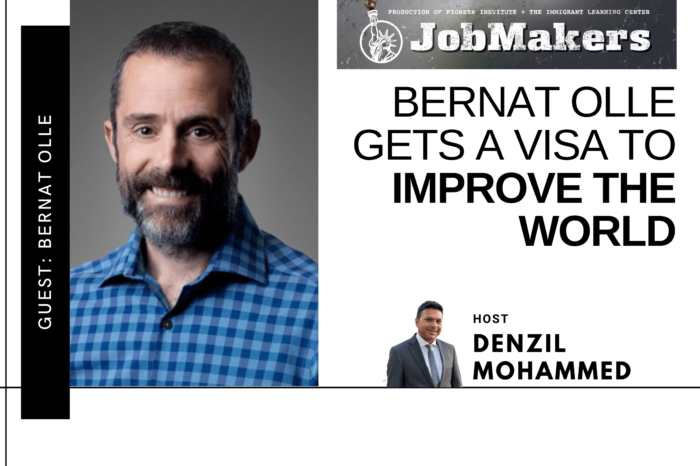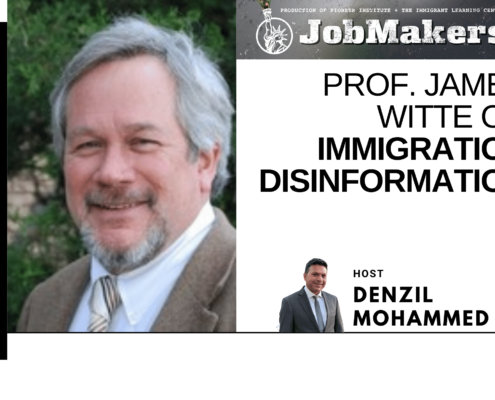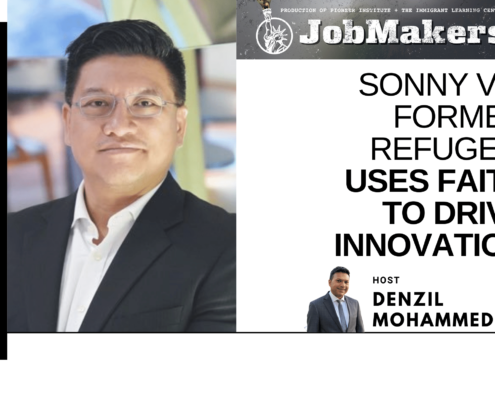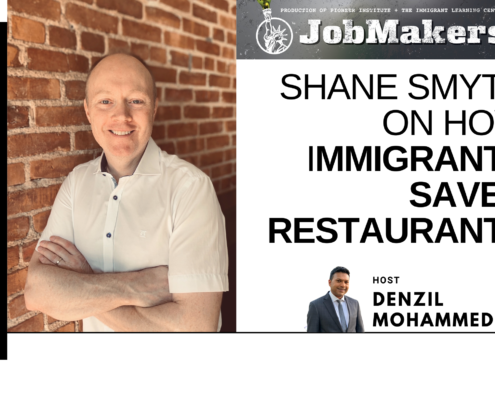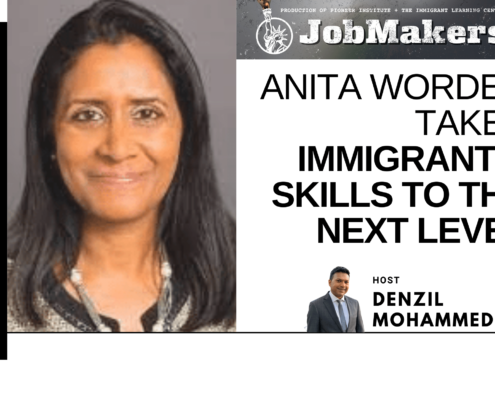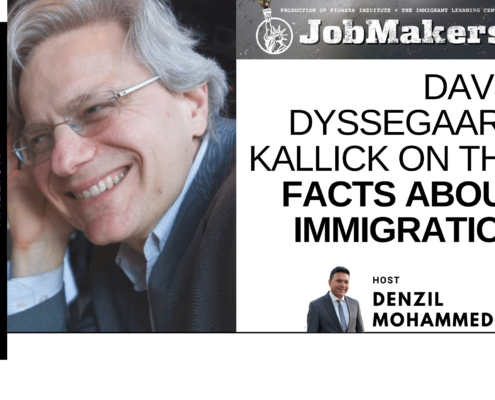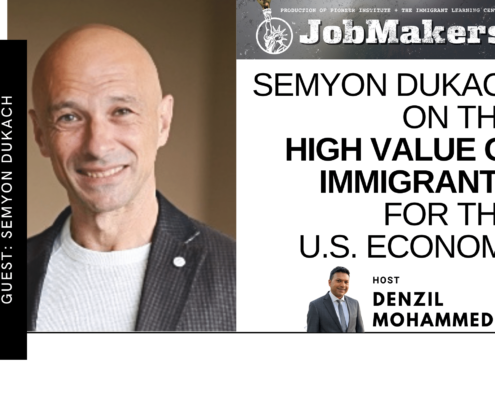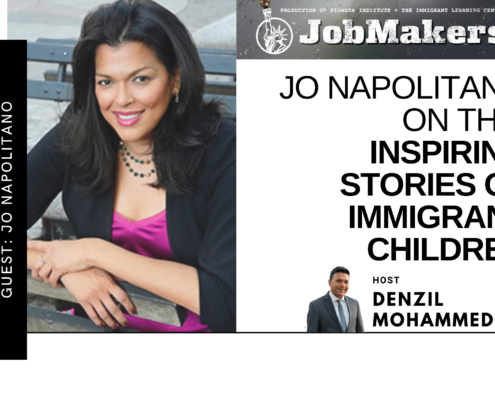Bernat Olle Gets a Visa to Improve the World
This week on JobMakers, Host Denzil Mohammed talks with Dr. Bernat Olle, co-founder and CEO of Vedanta Biosciences, about his journey from Catalonia, Spain, to Cambridge, Massachusetts, where he continued his Chemical Engineering studies at MIT. Navigating the complex immigration system while seeking purpose in his career, he eventually found his calling and was lucky enough to remain in the U.S. to see it through: designing a new class of medicines to modulate the human microbiome. They duscuss how everyone wins when foreign-born talent is welcomed into vibrant, entrepreneurial ecosystems like those in the U.S., when they’re able to collaborate with others from the U.S. and around the world and come up with incredible ideas to benefit all people. Bernat also expresses a sense of kinship with immigrants far removed from the labs and boardrooms. He knows that the same aspiration – opportunity – attracted those who came here with nothing but a suitcase and a dream, as you’ll discover in this week’s JobMakers.
Guest:
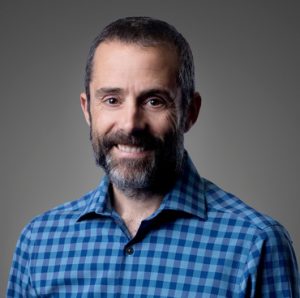 Dr. Bernat Olle is a co-founder and Chief Executive Officer of Vedanta Biosciences. He has been a member of the founding teams of several companies of the PureTech portfolio and served as a member of the Board of Directors of Vedanta Biosciences and Follica Biosciences. In 2013 Dr. Olle was named “Innovator of the Year” in MIT Technology Review Spain’s “Innovators under 35” awards. He also received the 2019 Barry M. Portnoy Immigrant Entrepreneur Award from The Immigrant Learning Center. He completed his doctoral work at the Chemical Engineering Department at MIT, where he developed a novel method for large-scale bacterial culture. During his graduate work, Dr. Olle was awarded the “la Caixa” fellowship. Dr. Olle received his B.S. in Chemical Engineering from Universitat Rovira i Virgili, in Catalonia, his M.S. and PhD. in Chemical Engineering Practice from MIT, and his M.B.A. from the MIT Sloan School of Management. He has published his work in journals including Nature and Nature Biotechnology.
Dr. Bernat Olle is a co-founder and Chief Executive Officer of Vedanta Biosciences. He has been a member of the founding teams of several companies of the PureTech portfolio and served as a member of the Board of Directors of Vedanta Biosciences and Follica Biosciences. In 2013 Dr. Olle was named “Innovator of the Year” in MIT Technology Review Spain’s “Innovators under 35” awards. He also received the 2019 Barry M. Portnoy Immigrant Entrepreneur Award from The Immigrant Learning Center. He completed his doctoral work at the Chemical Engineering Department at MIT, where he developed a novel method for large-scale bacterial culture. During his graduate work, Dr. Olle was awarded the “la Caixa” fellowship. Dr. Olle received his B.S. in Chemical Engineering from Universitat Rovira i Virgili, in Catalonia, his M.S. and PhD. in Chemical Engineering Practice from MIT, and his M.B.A. from the MIT Sloan School of Management. He has published his work in journals including Nature and Nature Biotechnology.
Get new episodes of JobMakers in your inbox!
Read a Transcript of This Episode:
Please excuse typos.
Denzil Mohammed:
I’m Denzil Mohammed, and this is JobMakers.
Denzil Mohammed:
Is it any surprise that the epicenters of innovation like Kendall square Silicon valley also have incredible diversity that the cities with the highest rates of PhDs like Brookline, Massachusetts, so Palo Alto, California, are multi-ethnic and multicultural, the United States attracts the world’s best and brightest to give us Google Tesla, the Madrona vaccine, but the thing that links the Nobel prize winning immigrants with those picking all vegetables and washing dishes is opportunity for Dr. Bernat Olle, co-founder and CEO of Vedanta biosciences, seeking opportunity, brought him all the way from Catalonia, Spain to Cambridge, Massachusetts, where he continued his chemical engineering studies at MIT navigating the complex immigration system while seeking purpose in his career. He eventually found his calling and was lucky enough to remain in the US to see it through designing a new class of medicines to modulate the human microbiome when foreign talent is welcomed into vibrant entrepreneurial ecosystems, like those in the US, when they’re able to collaborate with Americans and some people with people from around the world, they can come up with incredible ideas to benefit humanity, everyone wins. Bernat also feel a sense of kinship with immigrants far removed from labs and boardrooms.
Denzil Mohammed:
He knows that just like those with nothing but a suitcase and a dream, the same thing, brought them here, seeking opportunity, as we’ll discover in this week’s episode of JobMakers.
Bernat Olle:
Good to see you, Denzil.
Denzil Mohammed:
I remember you describing this concept of the microbiome and relating it to antibiotics in this fascinating story of your honeymoon. And you have this radical way of thinking of “no, let, let the body figure it out.” Take us back to that time. And, why is this kind of field of science important today?
Bernat Olle:
All species of animals live colonized with microbes on the skin, on the intestinal track and the mouth and the vaginal tract. All those are chock full of microbes. And that’s the way it’s been from the very beginning before we evolved as a species, this world was a bacterial soup. So every species has evolved surrounded by bacteria. And so it’s not surprising that this bacteria play very important roles in health, and specifically the bacteria that live in humans are referred to with the term human microbiome. And so that’s basically the collection of bacteria that you carry around for life with you. As soon as the moment you were born and specifically in the intestine, that community is more stance that we have the most bacteria, trillions of bacteria, almost as many or more microbial cells in your body than homosapien cells.
Bernat Olle:
And they play very important roles. They help protect from infection. They help calibrate the set point of the immune system, which is important in our immunity and allergy potential in cancer. And there’s a number of things that we do in our modern life that perturb that community. The diet that we eat has a big effect on the microbes that we have inside, because what we eat is what they eat. So the Western diet is generally not great for microbes. That’s maybe the reason why there’s a number of chronic diseases that are advancing more rapidly in the west and in the developing world. The use of antibiotics is another big perturbation. From the time we’re born until our teen years the average person gets tens of courses of antibiotics and cumulatively. Some of them can have a important effect in damaging the communities of microbes in the intestine.
Bernat Olle:
And so one of the things that we’re trying to do as a company is to be able to undo some of the collateral damage that antibiotics leave behind. Their use is sometimes warranted. Sometimes unwarranted, back to the honeymoon story, but they’re here to stay. And they’re very necessary in hospital settings, but also they create a series of issues, you know, use of antibiotics to prevent certain problems, and then other problems emerge. You become more susceptible to picking up infections from the hospital environment when your gut has no natural competitors against those pathogens. So one of the things we’re trying to do is ensure antibiotics have been used for the purpose they need to be used for and undo some of the damage by helping reconfigure or rebalance the community of bacteria that’s in the intestine that had been damaged by the antibiotic and in doing so, we hope as a starting point that we can prevent re-infections that are very problematic, for example, in hospital settings.
Denzil Mohammed:
When you were first starting out as an immigrant with an accent in the Boston area, how were you received? And as a European person, knowing what the entrepreneurial environment was like back then, let’s say in the late nineties, when you started school how do you think it would foreigner would have been received there?
Bernat Olle:
I think my integration in the US was very smooth. Today I am an American citizen. My child is American and Catalan and, and I identify as one of us. And I really have to think hard to think of instances where I have been treated as an immigrant in a negative way. The first year I came. I remember when I was a poor graduate student, I would go to buy my fruit at Haymarket if it had been there on weekend mornings. So it’s very cheap, but but it’s also terrible quality. Like half of the fruit is really literally rotten. And so I remember the first times I’d go there, I would try to pick the fruit rather than have the one that they hand you, because when they handed it to you, like half of it, you have to throw it away, but the store owners hate it when people try to pick the fruit.
Bernat Olle:
And so I remember you know, in one of my first visits, somebody really got ticked off that I was trying to pick the fruit and say, just go back to where you came from. But that’s like the only time that has ever happened to me. And if this was reversed, if it was like a person trying to like come to Spain, especially if you look any different than the locals. I feel like the racism there runs in different ways, the US has issues of course, with race. And there’s a lot of work to do. But I think some of the other countries, like in old-school Europe that have traditionally seen less immigration, and they’ve been more insular are much less prepared to welcome and assimilate people from other origins and get to a point where, where they’re one of them. I’m having a hard time imagining how the experiment in the opposite direction could have been smooth. And so I guess my parting point on this is that for all the issues that we have with immigration in the U S and with racism, the U S has done a much better job at assimilating and benefited from contributions of immigrants as just about any other country in the world.
Denzil Mohammed:
Thank you for acknowledging that. I think that’s a really important point to make, and that’s what makes this country special. I want to take it back a few years. You had the experience as did I, feeling that intense pressure where your visa is about to run out? You’re not sure what what’s going to happen, what you’re going to do is a lot of uncertainty. So tell us about that time for you.
Bernat Olle:
I’ve been doing my PhD at MIT, and I was hoping to find a job in the U S to stay here after the PhD. I was on a J-1 visa and that expired, you know, a short period of time after Igraduated, and I did an atrocious job search. I was just doing the work. And I figured, yeah, like when I’m done, people are going to want to hire me, because look, I went to this great school and the world doesn’t really work like that. Like you have to, you have to really do the homework. And, and basically what I found is that when I interviewed, I didn’t put a lot of care or thought into what I should do.
Bernat Olle:
I just interview with firms that were reputable. Why, because other people did it too. Like some of the well-known strategy consulting firms is a terrible way to go about picking a career incidentally. So I was rejected by just about every one of them. And it was only when I had a few weeks left on my visa and I really had to think through, okay, what do I really want to do that? Finally, I put some thought into like the career that I wanted and ended up going into, the direction that I went. My first job offer, which was in a venture creation firm in town that starts biotech companies,came really, really close to the bell. I guess it could have gone a different way and that bad planning could have resulted in me going back home. Then as you know, like finding a job from abroad becomes a much more complicated process. But because I did get a job here, then I jumped on the train of the H1 green card citizenship, which is a train that at most times in the United States has worked very well. During the last administration, there were some serious steps back as you know, but for me, this was actually a very smooth process.
Denzil Mohammed:
And it was around that time that you were able to secure a work in the US that this idea of purpose was playing a role in the kinds of jobs you were looking for and the kind of trajectory you wanted to have. I vividly recall another MIT grad on this podcast and immigrant entrepreneur saying that everyone from MIT graduates and, you know, wants to do good in the world. And then they go on to work at the biggest consulting firms. You were in a privileged position as an MIT graduate with a PhD. How did that idea of purpose and giving back shape where you are today and where do you plan on going with that?
Bernat Olle:
My career path was very much born out of rejection. I try to follow the career path that others in business school and in graduate school followed which is the classic, you know, try to go to a very well-known firm, like a strategy consulting firm or a bank where you’re paid very well, and it looks beautiful on a resume. And it’s basically the game of compensation, titles, prestige. And I probably very much would have played that game if I hadn’t been rejected The blessing was that by having been rejected from those firms and actually having to really think, okay, what do I really want to do? And the reality is that I had never dreamed about working for clients, evaluating mergers and acquisitions or market shares of consumer products. Like that’s not what I was passionate about. I liked science.
Denzil Mohammed:
That sounds like so much fun. Come on.
Bernat Olle:
I like science. I like biotechnology. In my free time, I would read papers. That’s what I would do. And so basically my first job was going to do something that I already liked to do for free, which was read about cool science, talk with inventors about cool science and try to figure out, you know, can you imagine translating that to people? And is there a role for a biotech company to try to do that? And that’s what I did for my first decade professionally, until one of these projects that I started became obsessive and offer me that I didn’t want to do anything else. And then I decided that I just focus on that full-time, and that was my current company
Denzil Mohammed:
Hearing you talk about your experience. I find it fascinating, and I see that an immigrant has a certain special quality, but at the same time, you were a young person. You were just going with the flow, doing what everyone else was doing. And as you said, you didn’t have this master plan. And so you end up with, you know, a few weeks before your visa is about to end, and then suddenly you have to go beyond what your classmates were doing and think more strategically and position yourself in such a way that you would be able to stay in the US and continue this investment that you had made to come all the way across the world, spend money in and get an education at MIT and continue living that dream. Today, you’re a strong advocate for immigration reform, particularly making it easier for immigrants like you, who are inherently entrepreneurial to start businesses here in the U S that create jobs for Americans. Tell us more about your feelings as to the immigration system being able to work for people like you and other high skilled immigrants.
Bernat Olle:
I think that the immigration system and the immigration culture in the US has been a gift for both the US and for immigrants during most times, and, and this country sort of has cycles and you know, depending on their government, we’ve moved forward or move backwards. But the arc has been in the direction of immigration adding a lot to the country. I think that the US is really in a privileged position where, because of its culture of having been more welcoming to people that come here seeking opportunity it has, and because of being an open liberal place in the world where such immigrant entrepreneurs can find a welcoming environment to actually pursue their objectives, which is something that other superpowers don’t have, like this combination of a welcoming culture.
Bernat Olle:
But because of that, a lot of folks have come here and, and made very substantial contributions to the economy and also benefited by developing their careers in a way that they could not have developed their careers back where they came from. So, you know, I think this is really a unique gift of this land that many other countries in the world would like to have. And I think this is very important very important to preserve because if in the future that sees and the talent entrepreneurial talent in in tech, in biotech and other areas decided that it’s better for them to develop their careers and pursue opportunities in China or somewhere else the US would stop being the very competitive economy and society that it is.
Denzil Mohammed:
And I’d like to direct our listeners to the fact that the Nobel prizes are being announced, and guess who’s winning them in the US? Foreign-Born people who came here to study and innovate has been a huge trend, 30% of all Nobel Laureates have been people born in other countries. Specifically the past four years we saw a dramatic decrease in the number of visas that were issued, the number of international students who were coming here to study. And then we have this pandemic and the first two vaccines came from companies that had immigrant co-founders. Not just that, immigrants are concentrated in industries that got us through the pandemic, like cleaning like healthcare. Can you talk a little bit about the impact of immigration in the U S during this pandemic, from what you’ve seen?
Bernat Olle:
Yeah. I mean, I can talk about biotechnology because that’s the field that’s near and dear to me. And you said, you’re right. The, the impact on how the world got out of COVID was sensational, right? You have the founder of, of BioNTech, the founders on Madronathe CEO of Pfizer and the list goes on because there’s many people that have been involved in this amazing vaccine projects that are immigrants that have been welcome. The combination has been so crucial, right? Because it’s not a coincidence that so much of the innovation with vaccines has happened in the US – it happened here because this is a country that values its pharmaceutical and biotechnology industry as a national security asset in ways that other countries in the world don’t. Other countries in the world are content with free riding with some of the innovation that takes place in the U S and not spending on those industries. In the U S the approach has been different.
Bernat Olle:
And, and then at the same time, you have this, these brilliant immigrants coming in, attracted by this environment and supercharging it by creating these companies that in the moment of need come through, right? And I think that Pfizer, Moderna, these groups coming through with a vaccine that we got in our arms in less than a year which was a completely new technology that had not been used before with precedent. It’s just phenomenal. You know, it’s not surprising to anybody in the industry that there were so many immigrants involved because, you know, you look at any company like our company, there’s a significant portion of folks that were born elsewhere. And the reality is that, you know, talent, intelligence skills are fairly widely distributed all over the world. And you know, the ability to attract it to Cambridge and concentrate it here so that companies can benefit from, is what’s made the biotech industry so powerful and so influential in Massachusetts.
Denzil Mohammed:
You’re in the business of saving lives. You’re a job creator. You’re a scientist, you’re in the heart of Cambridge, Massachusetts. Yet. I know that when you were awarded the Barry Portnoy immigrant entrepreneur award for life science in 2019, you found a link to your own immigrant story to those foreign born students from Africa and Eastern Europe that your mother taught many years ago. What is that link?
Bernat Olle:
My mother who’s now retired used to be a teacher and for, for a good part of her career she taught immigrants that were coming most often from the north of Africa, but other times from Eastern Europe and another times also from central America either because of war or unrest in their areas, or just because of proximity, allowing opportunity in the case of Northern African immigrants. This would often be, you know, a lot of immigration from Northern Africa. It usually came because we grow a lot of fruit in the country, and there was a need for labor to help pick it up. But now those communities have established and they stayed there and they brought their families and they needed to learn the language. They needed to learn how to apply for a driver’s license or how to fill a form for social security.
Bernat Olle:
And if you don’t speak the language and you don’t know some of the basic things it’s hard to do that first step of integrating, right? So my mom helped many of those immigrants with this first step of doing some of the basic things, like learning the language, learning how to learn, how to do some of the basic things that you’re gonna have to do to become a functioning citizen in this place. But, you know, there’s a common element in all forms of immigration, which is this search for opportunity, right? Looking for something better than maybe you don’t imagine being able to do where you are. And so in that sense, the mindset is, it’s the same mindset across all immigrants, right? You’re willing to leave certain things behind that you liked because you want to take the risk of something that could be better.
Denzil Mohammed:
And you’re leaving behind family and a culture that you grew up at and food that you loved in order to seek that opportunity. It’s not an easy thing to do. Bernat Olles, thank you so much for joining us on JobMakers. I really appreciate it talking to you today, and I wish you all the success in the world.
Bernat Olle:
Thanks, Denzil.
Denzil Mohammed:
Jobmakers is a weekly podcast about immigrant entrepreneurship and contribution produced by Pioneer Institute, a think tank in Boston and the immigrant learning center, a not for profit that gives immigrants a voice. Thank you so much for joining us for today’s inspiring story of another enterprising immigrant entrepreneur. If you have feedback or know someone, we should talk to, email D E N Z I L at jobmakerspodcast.org I’m Denzil Mohammed. Join us next Thursday at noon for another episode of JobMakers.
Related Posts:

